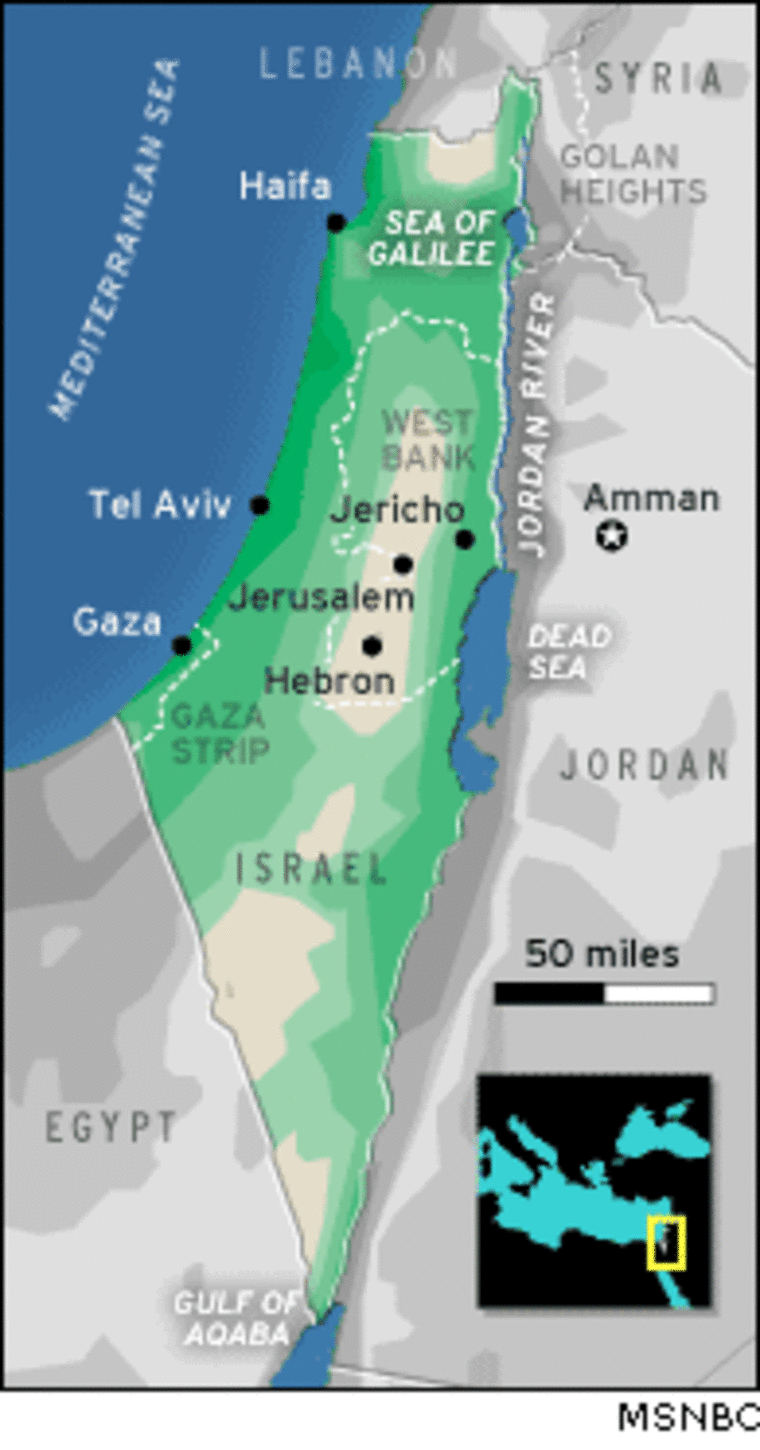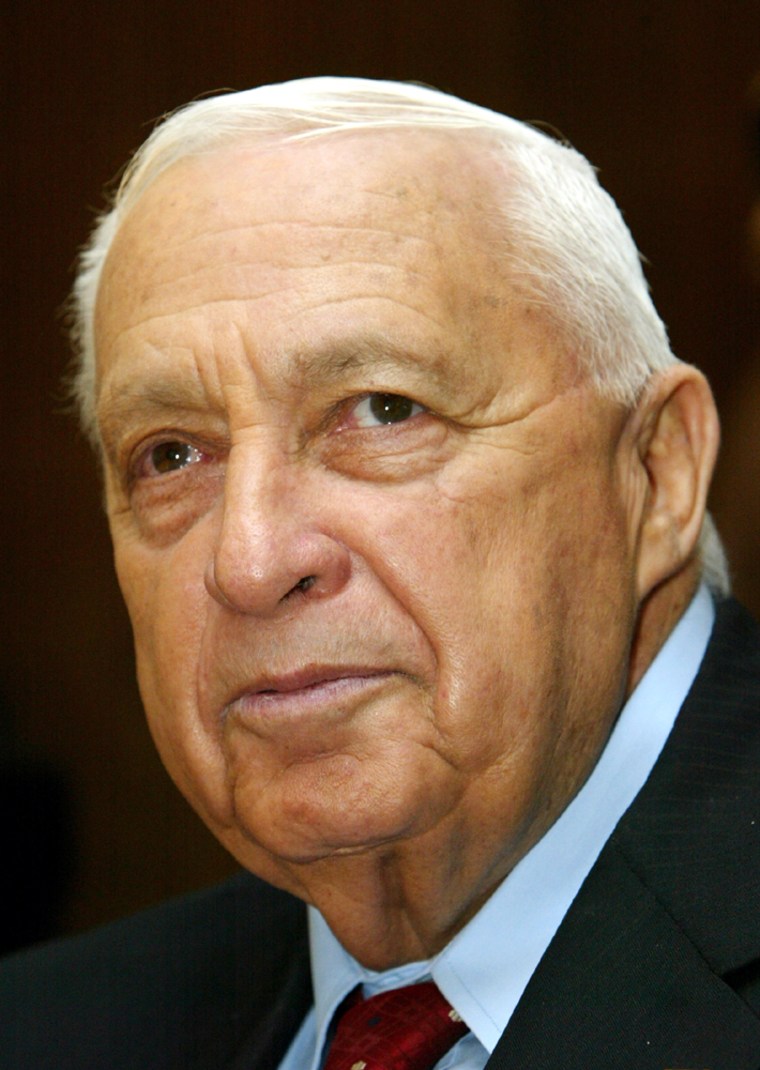Israeli Prime Minister Ariel Sharon remains steadfastly committed to his plan to withdraw Jewish settlers from the Gaza Strip and the West Bank despite a contentious meeting with settler leaders on Sunday when he rejected their demands that he hold a national referendum on the decision.
As a former champion of the settlement movement, Sharon's commitment to the withdrawal from the territories has set him firmly at odds with one of Israel’s most powerful political factions.
Sharon has pledged to put his "disengagement plan" to a parliamentary vote on Oct. 25 and, despite a rift in his hard-line Likud Party, he is expected to prevail with the backing of dovish opposition parties.
On Monday Sharon told reporters that he is required to bring his plan to parliament and will follow through, despite pressure from settlers.
"The responsibility of managing the issues of the country, the responsibility of the future of the country, is not the concern of just one group. It is the concern of the entire nation, and this burden is placed on my shoulders, and this is how I plan to behave," he said.
The settlers have countered that their meeting on Sunday with the prime minister was “disgraceful” and said that the prime minister is leading the country down a dangerous road that could lead to civil war. They vowed to press for a national referendum and will do everything in their power to prevent the withdrawal.
Sharon’s strategy
Evacuating the 8,200 Jewish settlers from the Gaza Strip, where they and the soldiers needed to protect them are surrounded by 1.3 million Palestinians, makes sound military sense to Sharon.

The lives of Israeli soldiers would be more easily protected if they were to be deployed outside the electronic fence which rings Gaza. One can imagine that there would be no argument from the Israeli military if they are ordered out for their own protection.
But the recent call by an influential rabbi for Orthodox Jewish soldiers to refuse orders to evacuate the settlements has gained traction among other low-ranking rabbis.
"The worst thing is to give in to threats of violence and to talk about disobeying orders,” Sharon said. “These are very grave things. I believe these things will be prevented because these are real dangers."
In a further incentive to depart, Sharon has ordered an increase in the amount of compensation payments given to settlers who are uprooted in order to evacuate the territories and comply with his disengagement policy.
Most sensitive domestic issue
Sharon has calculated that the Israeli left and international opinion, particularly in Europe, will be overwhelmingly favorable toward his plan to withdraw from Gaza.
But he has to overcome domestic opposition inside his own right-wing factions first.
There is no issue more contentious in Israeli politics than the settlers. Many Israelis see them as a vanguard of Jewish patriots anxious to secure the country's borders against hostile Arabs on all sides, while others call them obstacles to peace because they refuse to give up the Palestinian land they occupied by force.
The settlers feel personally betrayed by Sharon. Many voted for him to become prime minister because they believed he would never abandon them. Sharon helped plan and finance many of the settlements in the Occupied Territories during his long career as a soldier and politician.
So for Sharon to tell settlers the occupation was now a mistake and that it's no longer worth the risk and the cost of protecting them is a painful duty for him, and perhaps the beginning of one of his biggest political battles.
Backing of the country
Rebels in Sharon's ruling Likud party are against any withdrawal from Gaza unless there is a referendum first.
Some of the more right-wing parties say a pullback from any part of the Occupied Territories would be heralded by Palestinians as a victory, and that it would also send signals that terrorism can be successful, and that it can be rewarded with real gains on the ground.
As of now, Sharon plans to begin moving settlers out of Gaza within the next six months. He rejects the idea of a referendum, saying it would set a dangerous precedent by creating a public demand for additional referenda on other issues in the future.
One of Israel’s major television networks, Channel 10, found 65 percent of Israelis would vote in favor of Sharon's Gaza withdrawal plan if it went to a referendum, while 35 percent would oppose it.
Other public opinion polls find support for Sharon is still strong despite a setback last week when his speech opening a new session of the country's parliament was rejected by a vote of 53 to 44.
By meeting face-to-face with the settlers this weekend Sharon signaled his willingness to confront his opponents with a clear statement of intent — that he will go ahead with his plan whatever their objections, and that he is confident he can win this battle because he believes it's for the long-term good of the country.
